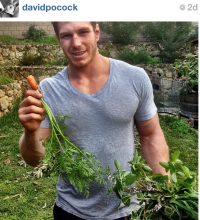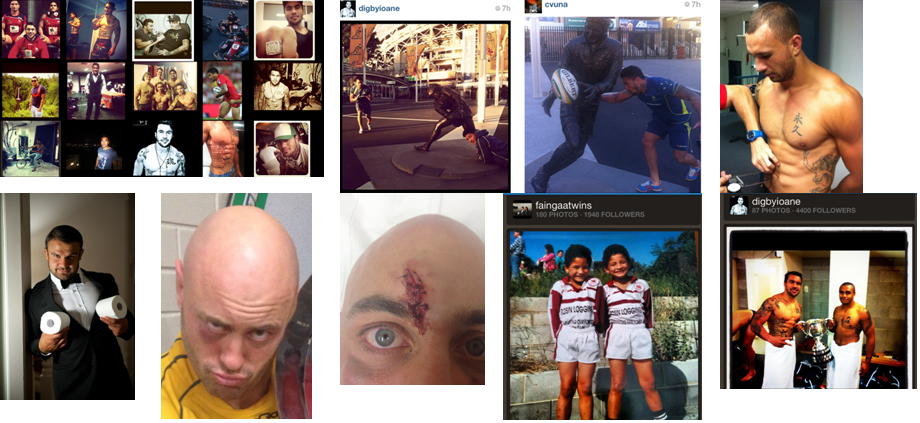
The use of social media by players has come under intense scrutiny in the mainstream media over the past weeks, and it would be very easy to assume that the best way for players to stay out of trouble is to simply stay off the evil social media.
But twitter and instagram give rugby players a direct voice to their fans, and an opportunity to show their personalities without the media hype, spin, and filtering of their franchise or governing body. When social media is done well players can show us that they do more than train, sleep, eat, tweet, and groom. They can show us what they stand for and what they believe in.
I love our game and I love the players in it, and I love seeing their quirky, funny, unfortunate and true personalities on twitter and instagram; I certainly don’t’ want to see it stop! Ahead of The G&GR Social Pages’ return to coincide with the start of pre-season training, I will be publishing a three week pre-Pages training program.
Week 1: Players- how to avoid being in The Social Pages for the WRONG reasons
Dear Players
You have an unprecedented ability to be heard in a crowded media landscape. You have a tremendous platform on which to stand up for things that matter to you. More than ever before you can build your own public image and be seen the way you want to be seen. You can talk about what you want to talk about, and promote what you want to promote. You can interact with your fans directly if you choose. Let’s face it- social media is pretty awesome! But there are a few things you need to be aware of.
The basics
Your followers will almost always follow everyone in your team that is on twitter and instagram; media savvy franchises such as the Reds are even publishing twitter handles in match programs and season guides. Your posts will all be seen by kids, the mainstream media, charities, potential personal sponsors, current sponsors, parents of kids who idolise you, your bosses, everyone you work with, and the people who will be making the decision whether to hire you in a “real job” once your career is over. This may either be very helpful, or potentially catastrophic.

Yes, lots of people ARE reading what you tweet. Oh, and once you post photos on instagram and twitter, those images can be used by any media outlet for the rest of your career. Even if you delete them straight away, someone will have already taken a screenshot of any ill-advised tweets and photos.
My advice
If you tweet solely to take the piss out of your friends and teammates, please understand that what you say isn’t a private conversation. If you”d be ok saying the joke or showing the photo in front of a few thousand people then it’s probably ok on twitter. If you wouldn’t do so to a crowd of more than a hundred though, possibly best to save it for Facebook.
If you tweet so that your followers can get an insight into who you are and what you stand for, please make sure that what you tweet reflects, well, who you are and what you stand for. The argument that “people don’t know the real me” doesn’t hold much water if you’ve tweeted 4000 times in the past six months; you have had 4000 opportunities to show people the “real” you.

Keep your “brand” consistent with how you tweet: if you want to be known as a player first and a dapper fashionista second, please don’t tweet about nothing but hair and fashion, then complain that people “just don’t see all the other stuff I do”. If you’re passionate about social issues, permaculture or marriage equality, tweet about it! Just be aware that the version of you that YOU put out there is what WE see.
If you want to get free stuff from sponsors, make sure you are a person they want to associate their brand with. If I were a car dealership looking at who to lend a car to, I would steer clear of the guy who tweets as if he’s “relaxed” off his face each weekend – it’s not a great look to associate your car brand with heavy drinking. You may not drink very often, the photo you posted may have been taken months ago, you may have posted it as a joke for a mate… but the thousands of people following you have no way of knowing that and they think that it just happened.
When responding to twitter critics (twitics?), trolls or offensive humans, I make only two requests:
– Don’t retaliate with racist, sexist, or homophobic comments; don’t retaliate by simply calling someone ugly. If you can’t do better than that, don’t say anything
– Remove their twitter handle (their name) when you quote the tweet! That way you aren’t giving scumbags free promotion (which might be what they want) and, more importantly, you aren’t actively contributing to the twitter bullying conversation by inciting your thousands of followers to gang up on a kid with a foul mouth and 30 followers.
Please don’t tell someone that they don’t know what they are talking about because they haven’t played professional rugby. In the same way that you have never refereed a State of Origin game but you can still have an opinion on the video ref decision, or that you’ve never played in the AFL but you tell us who should get player of the match, the fans are entitled to an opinion also. And if we make it a rule that only professional rugby players can have an opinion then it’s out with Nick McArdle, Greg Clarke, Gordon Bray, Murray Mexted, Buck Shelford, Brian Moore….and in with Burke, Kearns, Horan and…. David Campese. Is this really what anyone wants?

I love the game. I like many others who read the blogs and forums, loved the game before you started playing it, and I will continue to love it after you retire from playing it. We care about our game and how it is represented by those who play it. Next week we’re covering How to Get In The G&GR Social Pages for the Right Reasons. I know you’ll want to read it so you can make Cat’s job easier next year than it was at times this year!
Until next week, I wish you many man-hugs and bum-taps!
The G&GR Social Pages
Well, Social Pagers – did I miss anything?


